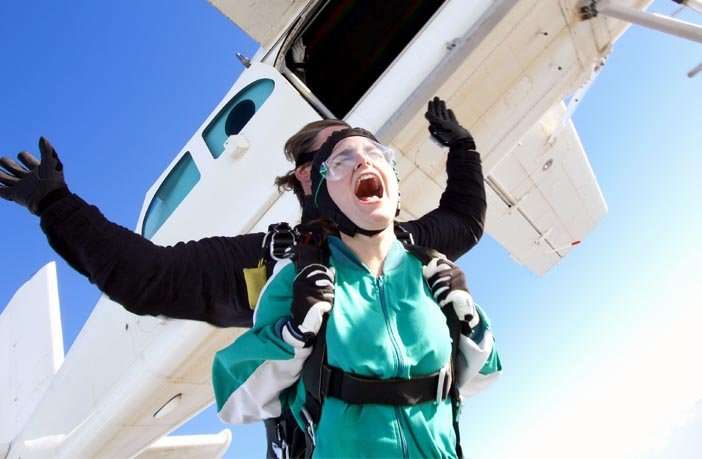New research sheds light on the hormonal fluctuations associated with skydiving. The research, published in the journal Biological Psychology, indicates that both the sex hormone testosterone and the stress-related hormone cortisol increase in anticipation of a thrilling event.
“I was convinced by some stellar students to conduct this study and much of the impetus behind it is from them putting their ideas into action. They wanted to examine skydiving as a stressor and pointed out that the prior evidence was mixed about that,” said study author Elizabeth (Birdie) Shirtcliff, an associate professor at Iowa State University.
“Since skydiving is thrilling, they asked if we could assay testosterone. It seemed obvious that testosterone – a hormone that is reactive to exciting and rewarding activities – would rise in response to skydiving, but the prior literature suggested the opposite.”
“This study seemed like the perfect opportunity to check our assumptions about testosterone. The prior literature also emphasized skydiving as stressful, but we hypothesized that it is both thrilling and stressful, and that the stress response and testosterone would actually work together during skydiving,” Shirtcliff said.
The study of 44 participants between the ages of 18 and 50 examined physiological and hormonal reactions to skydiving. The study included both experienced skydivers and first-timers.
The researchers collected saliva samples from the participants at multiple times both before and after the skydivers made their jump from 14,000ft. The samples were used to measure testosterone and cortisol levels. The participants also wore an Actiheart device, which monitored their heart rate before, during, and after the jump.
Testosterone increased leading up to the jump and then recovered afterward. This reactivity was especially pronounced among those who scored higher on a measure of sensation seeking. The researchers also found that greater higher testosterone reactivity was related to greater cortisol reactivity and higher heart rate.
“Testosterone has gotten a bad reputation, but it isn’t about aggression or being a jerk. Testosterone helps to motivate us to achieve goals and rewards. For those who find skydiving desirable (and are willing to do it), testosterone reactivity reflects those thrilling reward,” Shirtcliff told PsyPost.
“The body’s stress response also is active, helping testosterone to be more reactive and for skydiving to become even more fun and exciting. This thrill wasn’t just within sensation-seekers as that trait enhanced testosterone reactivity distinctly from the body’s stress response.”
“An important caveat is that the study was conducted on people who enjoy – and sought out – skydiving. The results should not be extrapolated to people where the thought of skydiving makes their stomach churn and palms sweat,” Shirtcliff noted.
Though men had higher testosterone levels in general, there was no significant difference found between testosterone reactivity in female and male participants.
“An important question that still needs to be addressed is about gender. We examined both males and females. We found the expected gender differences in testosterone levels, but both males and females showed equivalent testosterone reactivity. This rise in testosterone could exert a much larger physiological effect on females than males during skydiving and other exciting or engaging contexts,” Shirtcliff explained.
“This project represents the collective passion of many students and scholars in my SPIT lab,” she added. “I personally have been inspired by these young scholars to pursue research questions that seem so basic or obvious that they must have already been asked, but surprisingly, have gone unanswered. It also represents the dedication of GoldCoast Skydivers for letting a group of scientists show up with cryovials at the edge of a drop zone.”
The study, “Putting the Flight in ‘Fight-or-Flight’: Testosterone reactivity to skydiving is modulated by Autonomic Activation“, was authored by

Jbug311 on April 8th, 2019 at 17:47 UTC »
TIL a study confirmed increased heart rate just before jumping out of a plane. Who would’ve thought?
Far_General on April 8th, 2019 at 14:15 UTC »
Aggression factor is related more to DHT, which can also increase feelings of mistrust supposedly.
Nyrin on April 8th, 2019 at 13:50 UTC »
The layman reputation of testosterone and it causing "roid rage" behavior — extreme fits of aggression — is highly inaccurate to begin with. Within physiological levels that don't have a ton of extra problems with things like aromatase producing super high levels of other hormones, testosterone is actually associated more with fairness, patience, and confidence.
https://www.sciencedaily.com/releases/2009/12/091208132241.htm
Most of the studies we point to for "testosterone increases aggression" come from rodent models; castrated rats fight less and supplemented rats fight more. This doesn't really carry over to primate models, though, and (now I'm editorializing a bit) the connection seems to be more about "status" than aggression: rodents, it turns out, pretty much just fight to determine status; primates are quite a bit more complicated.
http://content.time.com/time/health/article/0,8599,1946632,00.html
https://www.sciencedirect.com/science/article/pii/S1364661311000787
Higher reactivity to threat makes sense in this model, as a loss of status is a "bigger deal."